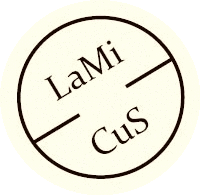Code of Ethics
LAMICUS adopts the publication ethic standards and guidelines outlined below.
1. Authors of manuscripts
Author is defined as a person who has substantially contributed to the text of the contribution and is responsible for the work done and presented in it. The list of contributors must also include anybody who participated in the analysis of the data and the preparation of the first version of the manuscript. Ghostwriting and guest authorship are not allowed.
2. Plagiarism
The work submitted by the author must be original. All use of the author’s own work or the work of other authors, be it direct or indirect, must be cited or referred to according to the standards or stylesheet used by the journal. The author is not allowed to submit the same paper to more than one journal. The author may be asked to submit any raw data that they have used in their research for inspection by the editors or reviewers.
3. Copyright
All necessary permissions to reproduce copyright material in the papers must be obtained and submitted by the authors. LAMICUS does not cover any costs that the author may incur to obtain the above-mentioned permissions.
4. Editors of manuscripts
The Editorial Board are responsible for implementing the above-mentioned ethical standards and guidelines. Decision to accept or reject any submitted manuscipt must take into account its originality and quality. Submissions that are not relevant to the scope of the journal will not be considered for publication. The Editorial Board may decide to publish special issues of the journal on condition that they contribute to its overall scope.
5. Reviewers of manuscripts
The Editorial Board should approach members of the Advisory Board to prepare reviews of the submitted papers or suggest competent reviewers. All reviewers should adhere to standards of expertise, anonymity, objectivity, and promptness. All peer-reviews are prepared free of charge; LAMICUS does not cover any other costs that might be incurred in the process.
6. Reviewing process
Submissions to the journal are subject to a blind reviewing process described in a separate document.
7. Confidentiality
The Editorial Board is obliged to ensure that all publication materials submitted to the journal remain confidential. Any information related to them can be disclosed only to authors, reviewers, and members of the Advisory Board.
8. Impartiality
Race, gender, sex, religion, political, social ideology and other non-quality related criteria may not be the ground for rejection of the manuscript. The decision of acceptance/rejection of a submission may only be based on the latter’s merit, regardless of personal sympathies or a lack thereof on the part of the Editorial Board.
Zasady etyczne
Czasopismo LAMICUS jest wydawane zgodnie z poniższymi standardami etycznymi.
1. Autorzy
Autorem jest osoba, która wniosła znaczący wkład w publikowaną pracę oraz jest odpowiedzialna za jej treść. Lista wymienionych współpracowników powinna obejmować wszystkie osoby uczestniczące w badaniach i analizie danych oraz w przygotowaniu pierwszej wersji artykułu. Niedopuszczalne jest umieszczanie na liście autorów osób, które nie uczestniczyły w przygotowaniu publikacji lub których wkład był minimalny (ghostwiriting i guest authorship).
2. Plagiat
Czasopismo przyjmuje wyłącznie prace oryginalne. Wykorzystanie innych prac autora lub prac innych autorów – bezpośrednie lub pośrednie – musi mieć formę cytatu lub zostać wyraźnie oznaczone zgodnie z przyjętymi zasadami (wskazówkami dla autorów). Czasopismo rozpatruje prace na zasadzie wyłączności – nie mogą być one jednocześnie złożone do publikacji w innym miejscu. Redakcja i recenzenci mają prawo wglądu w dane wykorzystane w badaniach.
3. Prawa autorskie
Autorzy mają obowiązek uzyskania wszelkich pozwoleń na wykorzystanie materiałów objętych prawami autorskimi. Redakcja pisma nie ponosi odpowiedzialności finansowej za uzyskanie ww. pozwoleń.
4. Redaktorzy tekstów
Komitet Redakcyjny ma obowiązek wdrażania i przestrzegania niniejszych zasad etycznych. Decyzję o przyjęciu lub odrzuceniu tekstu podejmuje się na podstawie jego jakości i stopnia oryginalności. Tematyka nadsyłanych tekstów musi być zgodna z profilem czasopisma. Komitet Redakcyjny może wyrazić zgodę na opracowanie specjalnego numeru czasopisma na tych samych warunkach.
5. Recenzenci
Komitet Redakcyjny winien zwracać się do członków Rady Naukowej pisma z prośbą o wykonanie recenzji zgłaszanych tekstów lub o wskazanie kompetentnych recenzentów. Recenzenci winni kierować się znajomością tematu oraz zasadami anonimowości i obiektywizmu, przygotowując recenzję bez zbędnej zwłoki. Recenzje wykonywane są nieodpłatnie; redakcja pisma nie pokrywa także wiążących się z nimi ewentualnych kosztów.
6.
Procedura recenzowania
Artykuły nadsyłane do czasopisma poddawane są anonimowej procedurze recenzyjnej szczegółowo opisanej w odrębnym dokumencie.
7. Poufność
Komitet Redakcyjny zobowiązany jest zapewnić poufność treści zawartych w złożonych materiałach. Mogą być one udostępniane tylko autorom, recenzentom oraz członkom Rady Naukowej.
8. Bezstronność i obiektywizm
Złożony
tekst nie może zostać odrzucony ze względu na rasę, płeć,
religię, poglądy polityczne lub społeczne autora, a tylko z
powodów merytorycznych. Podejmując decyzję o przyjęciu lub
odrzuceniu tekstu, redakcja pisma może kierować się wyłącznie
jego jakością i poziomem naukowym, bez względu na osobiste
sympatie i animozje.
